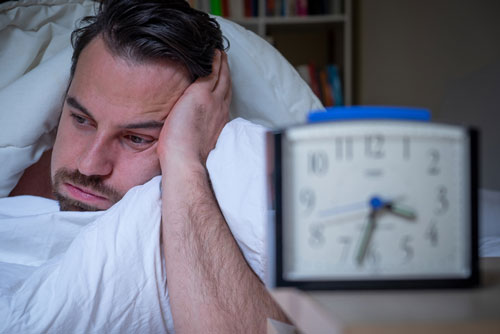There’s nothing like a good night’s sleep. And there are few things more frustrating than waking up at night and not being able fall back into slumber.
As the hours tick by, you toss and turn, wondering if you’ll be able to get any more shut-eye before the sun rises. If you don’t, you know that tomorrow will be a struggle.
This problem is called middle-of-the-night insomnia. It’s also sometimes referred to as sleep-maintenance insomnia.
If you have it, you’re not alone. A study published in the Journal of Psychiatric Research found that 36% of population suffers from regular bouts of middle-of-the-night insomnia.[1]
The study found that next-day drowsiness is one obvious effect, but not the only one. It can also contribute to obesity, depression, mental fog, stomach problems, and headaches.
Simple Strategies to Stop Sleep-Maintenance Insomnia
Here are five ways to keep from waking up or help you get back to sleep if you do:
- Stay away from your cell phone. If you’re lying in bed unable to sleep, you may be tempted to pick up your phone and check your email or scroll through news sites. Not only will that not help you fall back asleep, it will make it much harder.
W. Christopher Winter is the director of the Martha Jefferson Sleep Center. He says that electronic devices “emit light that can keep you up—especially the ones you hold closer to your face, like a mobile device.”
Exposure to light will shut down the production of melatonin—the hormone that makes you sleepy. And that goes double for blue-light emitting devices such as computers and cell phones. - Avoid alcohol in the evening. Yes, alcohol is a depressant, and it can make you feel drowsy. But it also disrupts REM sleep. That’s a deep, restorative level of slumber when you go through a cycle of dreaming. So alcohol may knock you out initially, but you’re likely to find yourself staring at the ceiling at 3 am.
There are other drinks that can help you get to sleep or go back to sleep if you wake up. These include: chamomile tea, ashwagandha tea, valerian tea, cherry juice, warm milk, and almond milk.[2] - Don’t stay in bed. If it’s taking you longer than 15 or 20 minutes to nod off again, it can be a good idea to get up for a few minutes.
Dr. James Findley is the clinical director of the University of Pennsylvania’s Behavioral Sleep Medicine Program. He recommends getting up and doing some light activities…stretching, a puzzle, or a little reading (from a book in dim light, not a device). Taking your mind off not being able to sleep is often the key to returning to it.[3] - Visualize something relaxing. Many sleep experts say the best way to go back to sleep is to conjure detailed mental images of whatever you find most relaxing…lying on a warm, peaceful beach while the waves gently lap at the shore, for instance.
- Do this breathing exercise. It’s recommended by the National Sleep Foundation:[4]
- Lie comfortably and focus entirely on your breathing. Note the sensation of air entering and leaving your nose as you inhale and exhale.
- Visualize the air as its sucked through your windpipe and into your lungs and then pushed out again.
- Identify tense areas of your body. Imagine them relaxing as you exhale.
- Picture your breath reaching into your head, shoulders, neck, and arms. Imagine these body parts releasing tension with every breath. If your attention wanders, gently direct it back to your breathing.
One more thing…
Don’t resort to sleeping pills. Not only can they be addictive and have side effects, but they don’t work very well. One study found they bring users only about 11 minutes of extra sleep a night…so they are hardly worth the risk.
Editor’s Note: Discover the most effective natural methods to improve your health. Read our monthly journal Independent Healing. It’s your best source for unbiased, evidence-based medical information you won’t find anywhere else. To find out more, go HERE.
Related Articles
Protect Yourself from Heart Disease While You Sleep
The Deadly Disease Caused by Lack of Sleep
The Best Sleep
Position for Good Health
[1] https://www.sciencedirect.com/science/article/abs/pii/S0022395608000472?via%3Dihub
[2]https://www.healthline.com/nutrition/drinks-that-help-you-sleep#8.-Almond-milk
[3]https://www.huffpost.com/entry/wake-up-in-the-middle-of-the-night-middle-insomnia_n_3353541
[4]https://www.sleepfoundation.org/articles/relaxation-exercises-falling-asleep

